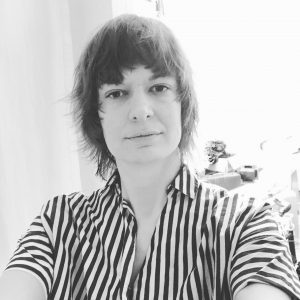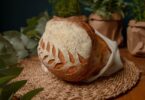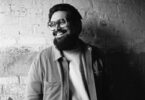Tanya Marquardt
A nude woman was sitting in my lap. I was looking at her through glassy booze filled eyes when her shaved head came into focus, my fingers curving around her hips to touch the downy hairs on her legs. Though my arm was around her, it felt more like she was all around me, soft flesh that smelled of cotton candy and Irish Spring soap. I wanted to release into her the way I did when I laid my head against my pillow at night. But she wasn’t a pillow, she was a person, and I didn’t want to overstep.
What is she doing? I wondered, And how did I get here?
Somewhere behind the closed door I heard an explosion of laughter from downstairs and it jogged my memory. I was playing cards and drinking whiskey with a local punk band in Vancouver. The woman in my lap was the lead singer. I had seen her earlier, mixing a drink in the kitchen in a synthetic see-through black skirt that had made my knees ache. An hour later we were in the bathroom, where she slung her arms around my neck, casual and playful with a cocked smile on her face, the smile of a cowboy.
Was this a gesture of friendship? Or did she have something more temporary in mind?
At that point in my life, fucking strangers was one of my favourite hobbies. But there had been no flirtation between us. I had downed six whiskey and cokes before hurling myself towards the bathroom, not sure if I had to piss or vomit, rummaging for toilet paper as she entered and wordlessly pushed me onto the toilet seat, giggling as I slipped on the frayed hem of my jeans and onto the cold lid. The feeling of her weight as she slid onto my thighs was a slow sinking downwards motion and heat came off her body as if she had been standing near a blazing fire. After some sustained eye contact, she stood up, straightened the collar of my shirt, and left the room. Jaw dropped, I watched her leave before my buzz came back strong and I floated into a blackout. I woke up the next morning clothed and splayed across the living room floor.
I was never sure why she came into that bathroom, but I don’t think she did it as an invitation. I think that somewhere over the course of the evening she saw me swearing and chain-smoking and guzzling hard liquor and decided that I needed to be shown something about vulnerability. I think she sensed that I was flying off into the stars and thought her body might be the warm stone that kept me rooted to the earth.
◊ ◊ ◊
I did a lot of things when I lived in Vancouver: I had boyfriends; I had girlfriends; I made theatre; I went to dance school; I joined an experimental circus; I went to Burning Man; I turned thirty; I moved to New York.
But through it all, I drank. I was the wild girl, the roommate in college who would disappear for days at a stretch to fuck in a semi-lit basement suite with nothing but a sweater and a backpack, then reappear just as my roommate was about to call the cops. I didn’t go on second dates—with guys, girls, or otherwise—unless I had sex on the first date. Once I fucked two guys and a girl in a single day—not a threesome. Three different people; three different bedrooms, riding my bike from a girlfriend’s house to a photographer’s place and later to a stranger’s apartment, a guy I met at a late-night pizzeria near my house. I often woke up on apartment floors having blacked out and then snuck out in the hopes of leaving undetected, as I had the morning after being with the nude woman in that bathroom, silently tip toeing down the front stairs.
◊ ◊ ◊
After I moved to New York and stopped drinking, I kept a low profile on home visits. Mostly I stayed on Vancouver Island and slept, stopping to touch trees on morning runs and letting my mom make me roast beef and gravy. I had the feeling that I wasn’t welcome in my old haunts but had no reason to believe that was true. No one had told me to stop coming around. But like an animal that had just shed its skin, I was raw and prone to injury. So I took my time and when I was ready, I started to reconnect with old friends, old lovers, old colleagues, old apartments I had lived in. I wanted to see my old life rendered new. I missed my friends and wanted to show them that I had been wishing the best for them and that I loved them.
I spent time on balconies smoking way too many cigarettes, walking through all that I had missed—weddings, marriages, failings, successes, children, divorce, love-affairs. People felt comfortable telling me about the most vulnerable parts of their lives because who would I tell? I was their old friend Tanya. They could tell me their secrets before I caught a plane back to New York, where they knew none of the people I knew, nothing about my other life. Every secret shared was bittersweet.
One night, walking near Commercial Drive, a woman I had slept with rode by me on her bike, a poet I took home after a night of heavy drinking at a strip bar in Burquitlam. I was on the sidewalk and I’m pretty sure she didn’t see me, or if she did, she kept riding as if she didn’t see me. If that was the case, I’m thankful for her mercy.
As I kept walking, it started to feel like I was in an augmented reality game, except that instead of little blue creatures navigating me to the nearest JCrew, it was my worst nights from the previous decade superimposed onto an ever gentrifying neighborhood: the street corner where I passed out in front of a friends party; the street light where I almost got beat up; the old house where I lived, where girls used to climb down my back trestle and run up the alleyway instead of letting me make them pancakes; the entrance to a small park where I had run my bike into a tree and the guy I was dating barely noticed because of how drunk he was—later, he pissed in my bed and when we finally stopped dating I made him buy me a new mattress and let him ass fuck me without protection; the time I fingered a woman in a bedroom at a house party while my boyfriend knocked on the door, crying for me to let him in.
◊ ◊ ◊
I feel that under my skin there is fur, and that under my human teeth are wolves’ teeth. I think, if that’s true then I am an animal, not a human animal but a beast, a creature who lives inside a human body and is a collection of drives—hungry or not hungry, horny or not horny, thirsty or not thirsty. When I stopped drinking I was told not to give over to this animal. But I am a feeling body—soft, fleshy, pliant—and what do I do about that? I fear that if I relax into that body I will lose the ability to manage my impulses and then I will hurt or I will cause hurt. So I tell myself to contain that flint, that potential spark, because even if I don’t mean to, I could set everything on fire.
◊ ◊ ◊
There is a Roman Catholic Church on 69th and Lexington, in Manhattan. Joan Didion walks out of it in B-Reel footage of the documentary The Center Will Not Hold and I’m not sure if it is “her” church or if she goes to church at all. I walked inside it once and the vaulted ceiling felt like it was a hundred feet above me. It had been months since my eyes had wandered along a horizon and longer since I had seen that kind of opulence: effigies of Jesus and Mary; statues of Saints; oil paintings of the Stations of the Cross and the crucifixion on all sides; everywhere coloured glass, the sun shining through the blues and purples and teals, revealing the shapes of angel’s wings; me sitting at a pew, midday, on my way home from class.
It’s all so much, I thought to myself.
In the corner, behind a gated partition of adored patterned wood, were twenty priests sitting in an alleyway-like chamber, facing one another. They were chanting from a hymnal—something they knew by heart but I had never heard before. Parts were in English, others in what sounded like Latin. What they were doing was choreographed. As one group of priests stood to chant, the others sat and listened and they teeter tottered, switching between chanting and listening, sitting and standing, passing a song back and forth between them.
At the time I couldn’t make sense of what I was seeing, but when I thought about it later, the singing felt like a blessing; a bird’s call, antiphon. Antiphon was an ancient Greek orator, a poet, but by the 15th century the church referred to antiphon as the repeated chanting of lines from psalms, an action embedded into the liturgy—from cantor to congregation and back again—underlining the importance of God’s teachings and revealing the mystical contents hidden in the space between the words.
◊ ◊ ◊
“You can’t get Djarum Black’s here,” I tell Marcus, my New York playwright friend. We’re at a coffee shop in Brooklyn, a meeting place for when we have writers block and need caffeine and conversation.
“Flavored cigarettes appeal to younger smokers, or so goes the thinking.”
Marcus’s brow furrows.
“What’s the difference between Djarum’s and Djarum Blacks?” he asks.
I lick my lips in search for the taste, still lingering from a month’s worth of midnight smoking sessions on Vancouver balconies. I let my mind wander fifteen years into the past and see Miranda, a Siouxsie Sioux lookalike and girl crush that I kissed at the end of a boozy night, after dancing under strobe lights to classic Cure singles.
“They taste like French-kissing a goth girl at three o’clock in the morning after the clubs kick you out. So, yeah. They’re fucking delicious.”
We laugh, or maybe more that I laugh at Marcus. I like to make him blush.
When I’m in Vancouver I embrace smoking. I tell myself that since I spend most of my time in New York, with its subway rats and garbage sludge, the pristine mountain air cleans me out enough to smoke at will. This is a lie reinforced by a daily five-kilometre run, which considering my old/new habit should be excruciating. But it isn’t. The fresh air catapults into my lungs, my nose overwhelmed by the sweetness of grass, the curling tops of ferns and cedar trees. One morning, running near my mother’s house, I am startled by a bird flying through the trees, the light peeking through the hanging canopy above me. I feel the silence of the dawn and it is the same feeling as when I saw the light through the stained glass in Joan Didion’s church on the Upper East Side. The silence there was deafening; outside was a busy New York street, but inside you couldn’t even hear the distant sound of an engine.
Out of that silence I remember walking away from the church on the way to the F train when a disgruntled old priest exited the side door to light a cigarette faster than the church’s ancient wooden door could shut behind him. We locked eyes. His were narrow, squinting into the last of the midday sun, and mine were open, a little shocked that one of the priests wanted to smoke after chanting. I had seen him inside and he had seen me; there was a look of recognition on his face. He was seeing me see him smoking. He paused though he didn’t hide or try to ignore me. After a beat he scowled and took a long drag off his smoke, caught with his proverbial hand in the cookie jar.
Weaving my way into pedestrian traffic, I realized that I was afraid. Inside the church the priest had looked pure; saint-like. But when I saw him outside he reminded me of older men that I had known in my life, men who had frightened me when I was alone with them as a child. Which made sense. For a long time I thought that every father, every male parental figure, was a child abuser. Which is probably why it took me so long to see that it should never happen. Not ever. Not even to me.
◊ ◊ ◊
I have stories of abuse, of assault; being attacked in the dark forests around my University; masturbators waiting for me outside bars, jacking off while they run toward my car with their jacket open; a week later, they watch to see if I see them sipping their beer across the bar from me; running out the back when I do.
Fucking cowards.
I’ve read the stories and I heard the testimony—bruised faces, the laughter of the rapist, the laughter of the denier and the one who supports the denier. I’m so sick of it, am done with priests, interlopers, substances, obliteration.
I want transgression; to obliterate the idea of dominion; transcend it through the reclaiming of pleasure and radical care for the feeling body; to flint that potential spark without setting everything on fire.
But how can I do that?
◊ ◊ ◊
I was sitting in a coffee shop in Brooklyn a few months ago when a woman walked into the room. Her earlobes, the sight of them, the smell of her skin, the soft hair on her neck, turned me to sand – right between the opening and closing of the door. In that split second, I wanted her to unlock my ribcage so that she could open me, reach in and touch my animal heart—my bones and my flesh in the palms of her hands. That first flush of lust reminds me of the first time a lover enters you. It’s always a surprise, isn’t it? That first slice, the realization that you’re going to be carved open by another person, that in order to cum it’s the only way, penetration or not.
That moment feels like transgression—the pleasure of being opened, the connecting of two or more bodies into to a single body, out into this massive social body, the body called us, called earth, called universe—without fear, without anger, without control, without anything particularly bad or good occurring—just sex, just pleasure.
Can two bodies even do that?
◊ ◊ ◊
When I am alone I fuck myself to the memory of the woman in the coffee shop, who turns into a man I saw on the subway platform, who turns into to the picture of Blondie on the book jacket of My 1980s and Other Essays by Wayne Koestenbaum, which turns into the sound of the wind on my bare ass that time Sam fucked me on that veranda and I wasn’t sure if anyone was watching because it was so early and so late, and Kris taking me to dinner and using their low gravelly voice to whisper Stay still as they put their fingers inside me while the waiter did our place settings. After diner, I took Kris to my apartment and used blood red rope to tie their arms from wrist to elbow, knocking them over with my foot, firmly, quickly, with precision—so that I could do the same ankle to knees—and just before I struck them, I leaned in and whispered, Stay still.
And years later, naked in a change room post performance, the make-up artist came in and stood beside me with a large plastic bin filled it with steaming water and a white washcloth.
Stay still, she whispered.
The closeness of her—the thick black hair of her preened and shiny, her body hiding under an oversized black sweater, her calves tight against her black leggings. I wanted to touch her but didn’t dare, was totally pliable, totally at her mercy.
She dipped the cloth in the water. The sound of its wringing aroused me in a way that I can’t fully explain, though I didn’t know if she would fuck me, that what she was doing counted as fucking. Starting with my face, my cheeks and jawline, my skin was alive where she touched, a slow, methodical activation. The back of my ears, my underarms, the nape of my neck. When she got to my breasts she didn’t linger, didn’t squeeze, but she didn’t rush. All was long, warm, strokes. Down each leg; the backs of my knees; another slow squeeze in the pail; then my ass, and finally the inner thigh, the mound of my pussy, all the parts of my vulva—clit, labia, the opening of my vagina—long, slow, steady strokes.
I didn’t gasp, I didn’t moan, I didn’t even cum. When she was done she gathered the pail in her arms, dropped the wash cloth into the water and walked away, leaving me alone in the change room. I stayed perfectly still until she was gone and collapsed into the wall, placing my forehead against its coolness, searching along its hardness for a way back to my personhood.
◊ ◊ ◊
The idea of anyone reading this makes me want to cry. That “they” might judge me. The vulnerability of being a body—visible, naked and open—feels like it cannot be tolerated in the broader sense, in the civilized world, a world of should and shouldn’t. And yet, I desire. I desire the other, desire the thingness of the other, a beloved thing. And if you are a beloved thing then I am that same thing, and there is no anchor, no personae, no other.
◊ ◊ ◊
I’m tired of the way I’ve been made to feel my whole life—feeling more comfortable in loose fitting clothing, sweaters and sweatpants. The time my friend, the local motel owner’s son, told me I would look more attractive if I folded my arms into my chest or shrugged slightly so that my long, lanky, arms would look shorter, more proportionate to what an acceptably attractive woman’s limbs looked like.
He was fourteen and I was twelve. We had been hanging out, guy’s guy and tom girl. Neither of us had any intention of getting together. He meant well and he shared smokes with me and mostly treated me like one of the guys, except when he didn’t. I loved him for that.
But, still. I’ve crossed my arms ever since and I strain in that space between my shoulder blades so hard sometimes I wake up unable to move my head, a pain so complete that it pulses through my body in spasmodic waves and I cry to breathe.
And why the baggy clothing? Why hide my body?
I enjoyed being a “girl” but I didn’t like being the stick figured hippy teen whose jeans hung off her like they were on a coat hanger. I wanted to be the girl allowed to sit wide legged on couches and wear oversized socks that were stuffed into large boots while others looked on with desire. I wanted it to be possible; the possibility felt like a sunset I could reach for but never touch.
◊ ◊ ◊
How painfully vulnerable I was; how painfully vulnerable I am.
◊ ◊ ◊
“What are you doing in there?” my stepfather asked me in the living room.
I was eleven and I stood in front of him sitting on the couch and said I didn’t know what he was talking about, but of course I did because suddenly I felt like vomiting, right there, all over the carpet. I knew what he was talking about, I just didn’t know the words. He accused me of using too much water and driving up the Hydro bill and I prayed that this might be it and that’s when he leaned forward and a snake smirk spread across his half drunken face and he laughed a bit as he looked at me, right in my face and asked again.
“What are you doing in there? Are you masturbating in there?”
And the smirk, the salaciousness of the smirk. I knew he wasn’t going to let me leave without an answer and that he was excited sitting in his chair, leaning forward, and me, eleven years old and he expected me to do something about it. The silence that followed was a sickly-sweet, vodka puke silence. The silence of his entitled anticipation and of my inability to do anything about it.
The bathroom was the only place in that house where I could lock the door, where I could have a moment away from his unpredictability; from him giving me the belt as punishment; from his buddies in the kitchen doing shots; from him bursting into my room at three in the morning playing an accordion he had taken from one of his customers, waking to his drunken epithets. He loved to punish me and he couldn’t have me in the bathroom, the one place he couldn’t have control of my body.
“No,” I said, “No, I’m not masturbating.”
◊ ◊ ◊
I wish I could stop being the child with scraped knees who knew what a vodka and coke tasted like long before she was old enough to legally drink one. The same girl whose babysitter’s daughter pushed her against a dresser and entered her from behind before she could spell. The girl whose only companion was a stuffed monkey. I used to have visions. I thought that a man who looked like a shadow would come to take my dreams away. When the darkness came, whether dream or reality, I would float above my body and watch what happened to it, looking down wondering, Who is that girl? What is she crying for?
◊ ◊ ◊
Shame was given to me before I knew what it was, before I knew what I was, and I’m surprised by the ways I defy that feeling, often through an unabashed immersion in sensation. Like the time I fucked Jessica in my bathtub. Wetness in all that wetness. She had her period and I fucked her with my hands, a towel under her when we first started in my bedroom, and I wished we hadn’t had to use protection. I wanted the bed sheets and the mattress to be covered in blood so that anyone who came into the room wouldn’t know what had happened.
“Where did all this blood come from,” they would ask, “Where are the bodies that were so covered in all this blood?” And not old blood, the colour of an old penny. Red, throbbing, blood.
I was almost remiss when I had to wash her off my hands, when I realized that I would have to wash my hands. It made me feel alive. Jessica kept apologizing and I kept asking her, “What for?”
◊ ◊ ◊
I fall in love with everybody. That’s the special power of a half adopted, half abandoned, half sister, half daughter. You learn to take love where you can get it. You settle for the amount you’ve been allotted. Everything comes in measurements—cream, sugar, flour, eggs—a makeshift meal with whatever ingredients you have in your cupboard. My body longs for a past that never existed; a past lover I let get away; a past family that I can’t remember. My past. The past. Broken shattered stones, trying to put it together, unable to let it go. I really know how to long, how to rail, how to feel the prick of abandonment and I am always going to want a little Alice Through the Looking Glass, one person looking into a parallel world with only a mirror between them.
◊ ◊ ◊
Kiss me. Kiss my lips and open them—use your tongue like a razor. I won’t bite unless you want me to. I won’t scream unless it’s time for that. I want your tongue in my mouth, touching my insides so that I can touch you touching me. I want all of you to touch me, touch me deeply, like a bird’s call, like a knife’s blade. I want you to scare me, to wake me, and I want always to be touched, even secretly, even in dark places. You can leave whenever you want too, go however you came.
A key and an entrance. A door and a mirror.
◊ ◊ ◊
It is the softness of people that breaks my heart, the rawness of them in spite of all they do to hide it—the lady who sneezes as she trips into a stranger’s arms; the punk girl near Prince Street, staring at her reflection in the storefront window, whose cowlick won’t go down, cannot be tamed, no matter how much green gel she slathers onto it. In service to the greater good, I know we have to speak, to walk, to fill out a form. But it’s the raw and the odd inside of that, the execution of the Coupé at the ballet barre with the severed toe.
The suture lies next to the wound; the opening as healing.
◊ ◊ ◊
Soft. Softness. Is that the suture’s opposite? To release into vulnerability. I am neither hiding or completely open, both to my detriment, like a newborn lying on my back, joints not quite set into hip sockets, shoulder blades afloat and drifting. I sometimes want to lose myself in another person, be subsumed by them. Something about breaking open, being exposed. Quivering.
I want an unfurling of legs like the rising of the day—birds in song, plants opening, people tap-tap-tapping their way to waking, kissing, writing, being. Always I feel the connection between things—the more disparate the more alike they seem—I hear taste; taste touch; touch smell; smell sight; see sound.
And I want you—beloved reader, beloved thing—to see my soft animal. I want you to see everything in these words even if they break into a fine dust, wring, strain, burst open and lay me bare. I want them to touch you and show you what life tastes like, but with letters, not talons. It’s like I’m standing above you silent in bare feet and I see the tear in your shirt; know what the flesh looks like there, the smell of cotton candy and Irish Spring soap. You wrap your arms around my thighs as we sit together. And sitting in your lap, naked with my wry cowboy smile, I sling my arms around your neck.
 Tanya Marquardt is a writer and performer, whose book Stray: Memoir of a Runaway was published by Little A and named a 2018 Best Queer History & Bio in The Advocate. Her play, Transmission, was published in the Canadian Theatre Review, and Some Must Watch While Some Must Sleep, Tanya’s play about being a sleep talker, was the subject of an NPR Invisibila podcast. She received her BFA in theatre at Simon Fraser University, a Certificate of Dance at MainDance, and an MFA in Creative Writing at Hunter College. Tanya lives and writes in Lenapehoking (Brooklyn, NY) and on the unceded land of the xʷməθkʷəy̓əm, Səl̓ílwətaʔ, and Skwxwú7mesh Nations (Vancouver, BC).
Tanya Marquardt is a writer and performer, whose book Stray: Memoir of a Runaway was published by Little A and named a 2018 Best Queer History & Bio in The Advocate. Her play, Transmission, was published in the Canadian Theatre Review, and Some Must Watch While Some Must Sleep, Tanya’s play about being a sleep talker, was the subject of an NPR Invisibila podcast. She received her BFA in theatre at Simon Fraser University, a Certificate of Dance at MainDance, and an MFA in Creative Writing at Hunter College. Tanya lives and writes in Lenapehoking (Brooklyn, NY) and on the unceded land of the xʷməθkʷəy̓əm, Səl̓ílwətaʔ, and Skwxwú7mesh Nations (Vancouver, BC).






